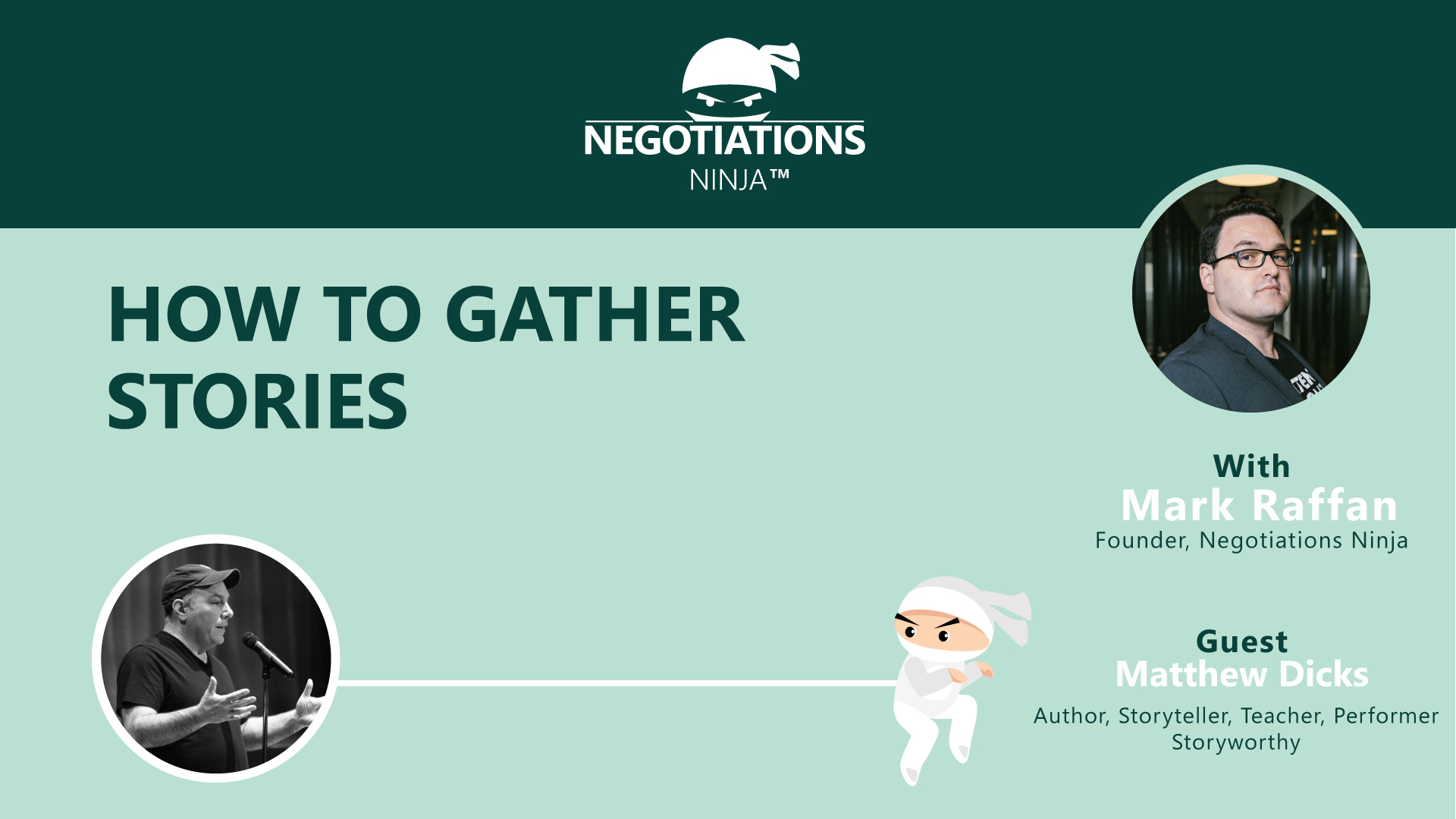How do you find the right stories to tell? Matthew Dicks is a phenomenal storyteller. He’s written several novels and non-fiction, including “Story Worthy.” He owns “Speak Up Storytelling” and “Story Worthy MD” to help people learn to become better storytellers—because everyone has stories to tell, they just don’t know it. He simplifies the story-gathering process in this episode of Negotiations Ninja.
Outline of This Episode
- [2:33] Learn more about Matthew Dicks
- [4:30] Everyone has stories to tell
- [6:20] Speak on theme, message, or meaning
- [8:30] Homework for life: gathering stories
- [14:15] Why location and action are important
- [19:02] How to weave stories into conflict resolution
- [23:49] How to make sure your stories connect
- [27:51] Have we lost the art of storytelling?
Everyone has stories to tell
The job of the storyteller is to bring meaning to a larger audience. Everyone has many stories to tell. The tragedy is that most of us don’t account for our lives. Time flies if you forget what’s happened in the last 365 days.
If a moment meant something to you, you can make it mean something to someone else. And if you’re a storyteller who’s invested in the idea that every day might contain a kernel of something worthy to remember, you’ll see so much in your life that other people miss.
Speak on theme, message, or meaning
Actively seek out stories from your life so that whenever you need a story for a particular purpose, you have one. When you match stories to theme, message, or meaning, you find stories that are meaningful to others.
Matthew was asked to speak at an anti-human-trafficking conference. The organizer asked, “How much research have you done on human trafficking?” His answer? “None.” She was taken aback.
When he spoke, he shared a story about teaching and the importance of how—when dealing with people—you can’t afford to allow people to say “It takes a long time to steer a boat in a new direction.” Why? It means kids are left behind.
With human trafficking, you can’t let it be the case because it means someone is being abused or losing their life. He spoke with adjacency. He didn’t speak on the topic but he did speak on the theme, message, or meaning. It can be powerful.
Homework for life: gathering stories
If everyone has a story to tell, how do you gather those stories?
At the end of every day, Matthew reflects on his day to find the most story-worthy moments. His original goal was to find one new story per month. He discovered that his life is full of multiple stories per day. He averages 7.8 story-worthy entries per day. It’s not that his life has become more interesting but the lens through which he views his life has become refined.
He keeps a spreadsheet. The A column is the date and the B column is the story. He writes enough to hold on to the moment. It must be a simple process or you won’t continue to do it. Don’t throw away important moments of your life because you think they’re worthless.
What moment happened today that made it different from any other day? Write it down. Matthew often grabs his phone and jots it down so he doesn’t forget it. He uses Notion to gather them together. You’re looking for a “huh” or “ha” moment, not necessarily a story. Don’t throw away moments that let you see the world in a new way.
Matthew shares the elements of a story that are most important to make it memorable and meaningful, so keep listening.
Resources & People Mentioned
- Matthew’s “Homework for Life” TedTalk
- Storytelling Courses & Workshops
- Storyworthy
- The Moth
- The Bluest Eye
Connect with Matthew Dicks
- Matthew’s Website
Connect With Mark
- Follow Negotiations Ninja on Twitter: @NegotiationPod
- Connect with Mark on LinkedIn
- Follow Negotiations Ninja on LinkedIn
- Connect on Instagram: @NegotiationPod




